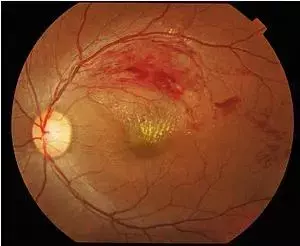- Home
- Medical news & Guidelines
- Anesthesiology
- Cardiology and CTVS
- Critical Care
- Dentistry
- Dermatology
- Diabetes and Endocrinology
- ENT
- Gastroenterology
- Medicine
- Nephrology
- Neurology
- Obstretics-Gynaecology
- Oncology
- Ophthalmology
- Orthopaedics
- Pediatrics-Neonatology
- Psychiatry
- Pulmonology
- Radiology
- Surgery
- Urology
- Laboratory Medicine
- Diet
- Nursing
- Paramedical
- Physiotherapy
- Health news
- Fact Check
- Bone Health Fact Check
- Brain Health Fact Check
- Cancer Related Fact Check
- Child Care Fact Check
- Dental and oral health fact check
- Diabetes and metabolic health fact check
- Diet and Nutrition Fact Check
- Eye and ENT Care Fact Check
- Fitness fact check
- Gut health fact check
- Heart health fact check
- Kidney health fact check
- Medical education fact check
- Men's health fact check
- Respiratory fact check
- Skin and hair care fact check
- Vaccine and Immunization fact check
- Women's health fact check
- AYUSH
- State News
- Andaman and Nicobar Islands
- Andhra Pradesh
- Arunachal Pradesh
- Assam
- Bihar
- Chandigarh
- Chattisgarh
- Dadra and Nagar Haveli
- Daman and Diu
- Delhi
- Goa
- Gujarat
- Haryana
- Himachal Pradesh
- Jammu & Kashmir
- Jharkhand
- Karnataka
- Kerala
- Ladakh
- Lakshadweep
- Madhya Pradesh
- Maharashtra
- Manipur
- Meghalaya
- Mizoram
- Nagaland
- Odisha
- Puducherry
- Punjab
- Rajasthan
- Sikkim
- Tamil Nadu
- Telangana
- Tripura
- Uttar Pradesh
- Uttrakhand
- West Bengal
- Medical Education
- Industry
Female hormone therapy not linked to retinal vascular occlusion; JAMA Ophthalmology

According to a recent study findings, filling a prescription for Female Hormone Therapy (FHT), and presumably taking FHT, does not increase the risk of Retinal Vascular Occlusion (RAO) or RVO.
The interesting findings have been published in JAMA Ophthalmology.
Female hormone therapy (FHT) includes oral contraceptive pills (OCPs) in women of reproductive age and hormone therapy in postmenopausal women. It is well documented that Oral contraceptives are associated with cardiovascular disease, ischemic stroke, venous thromboembolic disease, and breast cancer. Retinal vascular occlusions share the same risk factors as cardiovascular and cerebrovascular disease. To date, numerous case reports have associated oral estrogen use with developing RVO or RAO.
To have a in-depth understanding on this topic, researchers undertook a study to determine whether filling a prescription of female hormone therapy (FHT) is associated with an increased risk of retinal artery occlusion (RAO) or retinal vein occlusions (RVO).
For the study design,a multiple-cohort study was conducted using an administrative claims insurance database comparing women who filled a prescription for FHT with matched control individuals. Exclusion occurred for those enrolled for less than 2 years in the plan, with no prior ophthalmologic examination, with a history of a RAO/RVO, with systemic diseases/medications that affected estrogen levels, or a disease associated with an increased risk for thromboembolism.
The primary outcome was the incidence of a new diagnosis of RAO or RVO. Subanalyses were conducted to stratify by age, race/ethnicity, diabetes, and hypertension.
A total of 205 304 women who filled a prescription for FHT were matched to 755 462 control individuals. After inverse probability of treatment weight, the study cohort was a mean age of 47.2 years, 71% were White, 7% were Black, 6% were Hispanic, 3% were Asian, and 3% were unknown.
On analysis, the following facts emerged.
- There were 41 cases (0.01%) of RAO and 68 cases of RVO (0.02%) in the FHT cohort. In comparison, there were 373 cases of RAO (0.05%) and 617 cases of RVO (0.08%) in the control cohort.
- After inverse probability of treatment weight, Cox regression analysis showed no difference in hazard for RAO, RVO, or combined outcomes in the FHT cohort relative to the control cohort (RAO HR, 1.17; 95% CI, 0.83-1.65; P = .36; RVO HR, 1.07; 95% CI, 0.82-1.39; P = .65; combined HR, 1.10; 95% CI, 0.89-1.36; P = .37).
- Subanalyses that stratified by age, diabetes, and hypertension similarly showed no significant associations between the FHT prescription cohort and all outcomes.
"Despite many forms of oral contraceptives and female hormonal therapy being recognized as a risk factor for thromboembolisms,9,12,14,28 these hormones do not appear to affect the eye as they do in other areas of the body" wrote the team.Primary source:JAMA Ophthalmology
For full article follow the link: 10.1001/jamaophthalmol.2020.4884
Dr Satabdi Saha (BDS, MDS) is a practicing pediatric dentist with a keen interest in new medical researches and updates. She has completed her BDS from North Bengal Dental College ,Darjeeling. Then she went on to secure an ALL INDIA NEET PG rank and completed her MDS from the first dental college in the country – Dr R. Ahmed Dental College and Hospital. She is currently attached to The Marwari Relief Society Hospital as a consultant along with private practice of 2 years. She has published scientific papers in national and international journals. Her strong passion of sharing knowledge with the medical fraternity has motivated her to be a part of Medical Dialogues.
Dr Kamal Kant Kohli-MBBS, DTCD- a chest specialist with more than 30 years of practice and a flair for writing clinical articles, Dr Kamal Kant Kohli joined Medical Dialogues as a Chief Editor of Medical News. Besides writing articles, as an editor, he proofreads and verifies all the medical content published on Medical Dialogues including those coming from journals, studies,medical conferences,guidelines etc. Email: drkohli@medicaldialogues.in. Contact no. 011-43720751


